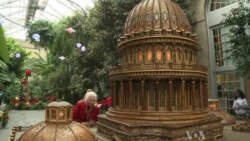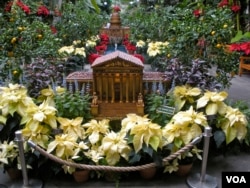It’s winter in Washington and its cold outside. But inside the U.S. Botanic Garden, in the heart of the nation’s capital, the temperature’s warm and the holiday spirit is high.
Each year, the huge greenhouse is decorated with seasonal displays that have charmed visitors for almost a decade.
Executive director Holly Shimizu said the winter exhibit, “Seasons Greenings,” is one of the garden's most popular attractions “because it helps get people in the holiday spirit.”
Natural wonders
Highlights of the exhibit include artistic representations of landmark monuments and buildings in Washington that look like replicas of the real thing.
Nestled among colorful Poinsettias and other seasonal greenery, there are model-like structures such as the White House; Washington Monument, complete with blinking red lights; Lincoln Memorial with a miniature President Lincoln inside; and an interpretation of the U.S. Capitol, which is just a few steps away from the gardens.
“”It’s all about the details and the mysteries and surprise when you come to this show,” said Shimizu.
But what really makes the structures special, she says, is that they’re all made from natural plant materials.
“You can notice that things like leaves are used and acorns from the oak trees and some of the wood from the willow tree,” she said. “These are gathered in the woods by the artists that make these incredible structures.”
The structures are very detailed and painstakingly created; the representation of the U.S. Capitol took more than 600 hours to complete.
“We also have one of the Smithsonian buildings and we have the Supreme Court," said Shimizu. "We have the Library of Congress; many of the buildings that a visitor to Washington, D.C. would see when they came to Washington, lining the National Mall."
Nod to the past
Other holiday favorites include the model trains which run on more than 244 meters of track, passing structures replicated from past World’s Fairs, which happens to be this year’s theme. They include the Eiffel Tower from the 1889 Paris Fair and the Space Needle from Seattle's 1962 fair.
“My favorite part was seeing the expressions on the children’s faces,” said Rachel Smalley, who visited from the state of Massachusetts, “and how mesmerized they are at watching that beautiful exhibit and of course all the natural materials that were used in building the monuments.”
But Smalley has her own favorites too.
“I particularly like the indoor Christmas tree which is the largest in a public building in Washington…and of course the Poinsettias are just beautiful with all the colors.”
Shimizu is pleased by visitors' positive reactions to the exhibit year after year, and also by its usefulness as a tool to remind people plants are critical to all aspects of our lives; for our food, medicine, clothing, home, and the environment.
“We’re always in the business of educating people about plants, and so we generally do tie in the role that plants play in our lives,” she said. “And that’s the message we want to reinforce whenever you come here.”
The U.S. Botanic Garden, located on the grounds of the U.S. Capitol, was established by Congress in 1820 and is one of the oldest botanic gardens in North America.
Each year, the huge greenhouse is decorated with seasonal displays that have charmed visitors for almost a decade.
Executive director Holly Shimizu said the winter exhibit, “Seasons Greenings,” is one of the garden's most popular attractions “because it helps get people in the holiday spirit.”
Natural wonders
Highlights of the exhibit include artistic representations of landmark monuments and buildings in Washington that look like replicas of the real thing.
Nestled among colorful Poinsettias and other seasonal greenery, there are model-like structures such as the White House; Washington Monument, complete with blinking red lights; Lincoln Memorial with a miniature President Lincoln inside; and an interpretation of the U.S. Capitol, which is just a few steps away from the gardens.
“”It’s all about the details and the mysteries and surprise when you come to this show,” said Shimizu.
But what really makes the structures special, she says, is that they’re all made from natural plant materials.
“You can notice that things like leaves are used and acorns from the oak trees and some of the wood from the willow tree,” she said. “These are gathered in the woods by the artists that make these incredible structures.”
The structures are very detailed and painstakingly created; the representation of the U.S. Capitol took more than 600 hours to complete.
“We also have one of the Smithsonian buildings and we have the Supreme Court," said Shimizu. "We have the Library of Congress; many of the buildings that a visitor to Washington, D.C. would see when they came to Washington, lining the National Mall."
Nod to the past
Other holiday favorites include the model trains which run on more than 244 meters of track, passing structures replicated from past World’s Fairs, which happens to be this year’s theme. They include the Eiffel Tower from the 1889 Paris Fair and the Space Needle from Seattle's 1962 fair.
“My favorite part was seeing the expressions on the children’s faces,” said Rachel Smalley, who visited from the state of Massachusetts, “and how mesmerized they are at watching that beautiful exhibit and of course all the natural materials that were used in building the monuments.”
But Smalley has her own favorites too.
“I particularly like the indoor Christmas tree which is the largest in a public building in Washington…and of course the Poinsettias are just beautiful with all the colors.”
Shimizu is pleased by visitors' positive reactions to the exhibit year after year, and also by its usefulness as a tool to remind people plants are critical to all aspects of our lives; for our food, medicine, clothing, home, and the environment.
“We’re always in the business of educating people about plants, and so we generally do tie in the role that plants play in our lives,” she said. “And that’s the message we want to reinforce whenever you come here.”
The U.S. Botanic Garden, located on the grounds of the U.S. Capitol, was established by Congress in 1820 and is one of the oldest botanic gardens in North America.






